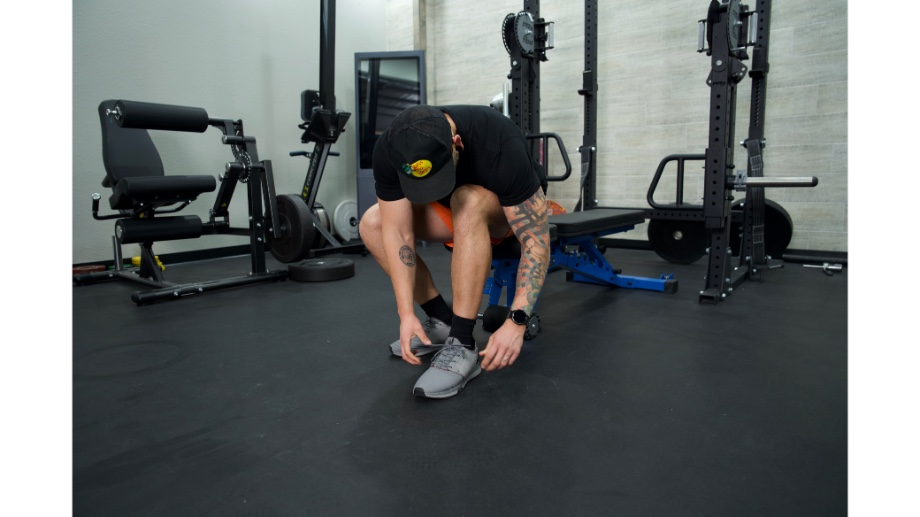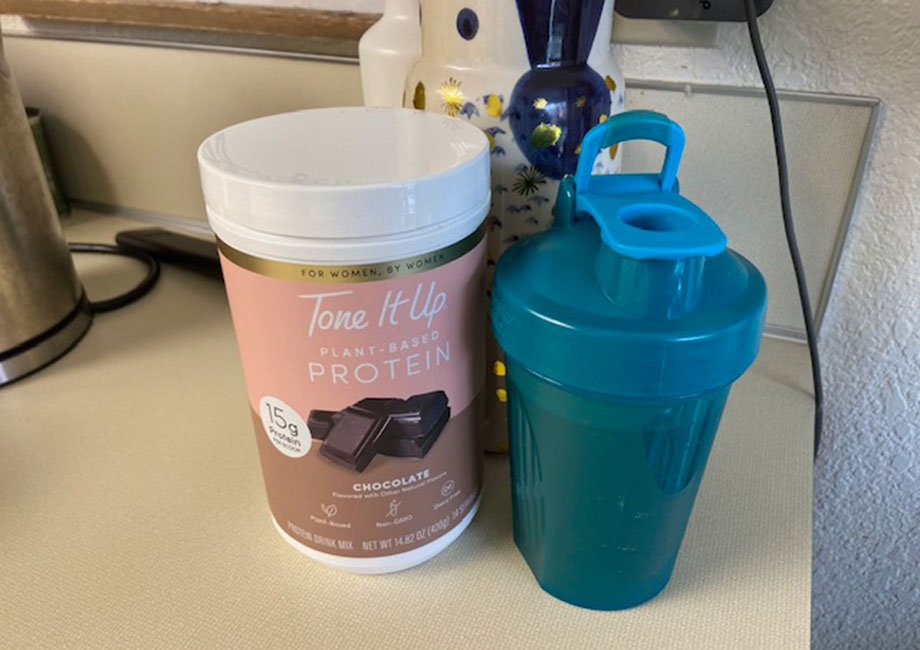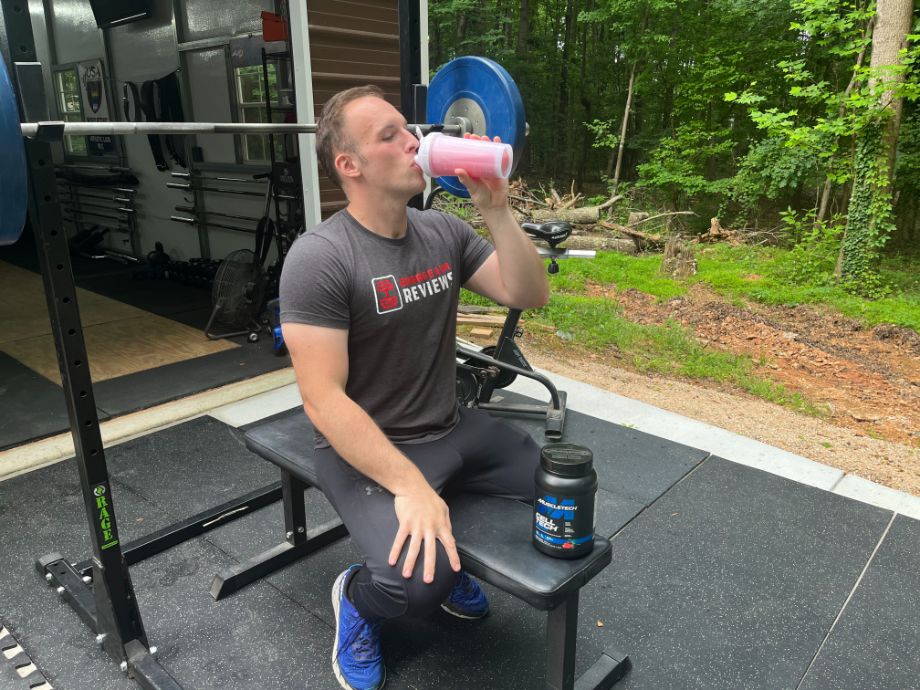Pre-workout supplements are formulated with energizing ingredients to get your body and mind prepped for a workout. Using a pre-workout can raise energy levels and boost mental focus, endurance, and strength. Pre-workout helps you dial in so you can reach new personal bests, like lifting heavier, squeezing in an extra rep, or adding time and distance onto a run.
The most common energy-enhancing ingredient added to pre-workout supplements is caffeine. Caffeine, which is naturally found in coffee, tea, and chocolate, is a stimulant that, as the name suggests, stimulates your central nervous system (aka your brain) to increase alertness and enhance focus.
If you’re a coffee drinker, you may be wondering if your brew of choice can pull double duty and be used as a pre-workout. The short answer is yes, coffee is a natural pre-workout and can be an effective way to bring more energy to your training session and improve workout performance. However, there are some pros and cons you should know before committing to coffee as your pre-workout of choice.
In this article, we’re breaking down all the buzz about using a coffee pre-workout, including evidence-based benefits, how much coffee to drink before exercising, how to time your pre-workout coffee, and potential side effects to watch out for. Let’s dive in.
Medical disclaimer: This article is intended for educational and informational purposes only. It is not intended as a substitute for medical advice. For health advice, contact a licensed healthcare provider.
Coffee Pre-Workout: Is It a Good Idea?
If you’re simply looking for something to boost energy before exercising, regular coffee can be a very effective pre-workout. As mentioned above, caffeine is the one ingredient coffee has in common with pre-workout supplements. If you’re already a coffee drinker, timing your java to your workouts can be a cost-effective way to boost energy and performance without having to purchase pre-workout supplements.
Coffee is also pretty safe for most healthy adults. In the 1980s and 1990s, caffeine was on the list of banned substances for athletes, but this was reversed in the early 2000s. Many athletes today legally and safely use caffeine to enhance athletic performance.
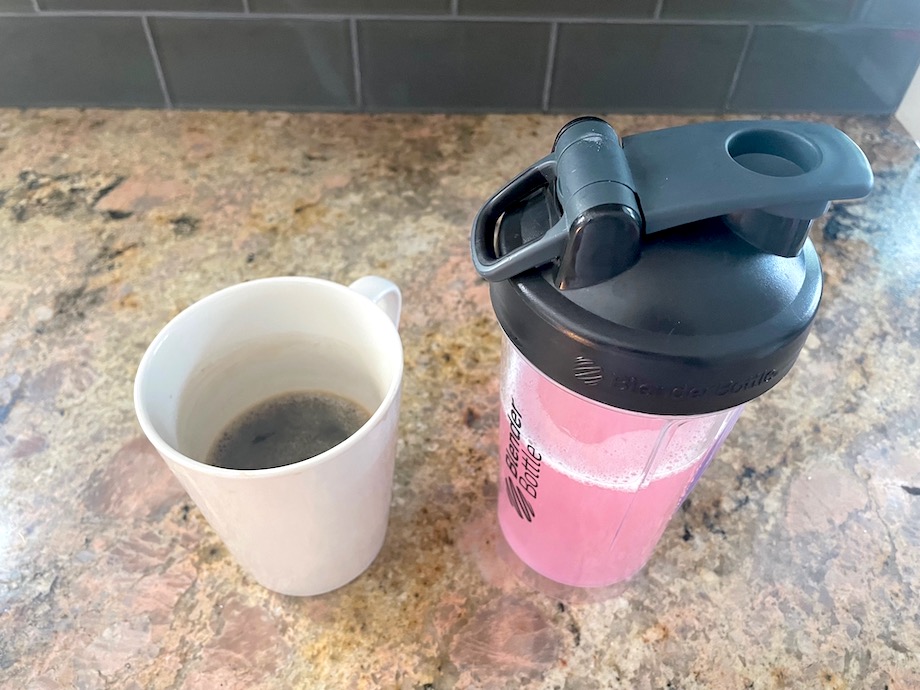
Coffee is a convenient pre-workout drink because it’s readily available, whether you prefer to brew it at home or pick up a cup on the way to the gym. Coffee is also a good source of antioxidants and can support overall health and wellness.
RELATED: Coffee vs Pre-Workout
Coffee won’t be your ideal pre-workout if you hate the taste of coffee, are super sensitive to caffeine, or looking for stim-free options. Picking coffee over pre-workout supplements may be the right choice for you if you prefer the idea of drinking a natural source of caffeine or a single-ingredient product. Many pre-workouts contain other ingredients, like sweeteners, flavors, and food dyes that some people wish to avoid.
However, many pre-workout supplements are formulated with additional ingredients, like beta-alanine, creatine, and/or branched-chain amino acids (BCAAs). These additional ingredients offer benefits to muscle function and workout recovery beyond what a cup of coffee can offer you. The right choice for you depends on your fitness goals.
RELATED: Best Pre-Workout with BCAAs
Let’s take a closer look at the benefits of caffeinating with coffee pre-workout.
Benefits of Coffee Pre-Workout
The effects of caffeine on exercise have been extensively studied. The International Society of Sports Nutrition’s official stance on caffeine is that it is an effective ergogenic aid 1 or exercise enhancer and can improve both physical and cognitive performance during a workout.
Since coffee is a source of caffeine, it can benefit your workout in a number of ways. This may be obvious, but decaf coffee doesn’t offer the same health benefits. Here are some evidence-based benefits of using coffee pre-workout2:
Boosts Energy and Wakefulness
Many people start their day with coffee to feel more awake and ready for the day ahead. The caffeine in coffee binds to receptors in your brain and blocks adenosine, a chemical that helps regulate sleep1. The less adenosine there is, the less tired you feel.
Drinking coffee pre-workout can provide the same energy boost to help you feel ready to work out.
Improves Aerobic Endurance
Consuming caffeine pre-workout seems to bring a stronger effect to aerobic activities compared to anaerobic activities. That means coffee pre-workout can help you pick up the pace and distance on cardio activities, like runs, swims, and bike rides.
Enhances Muscular Strength and Power
The exact mechanism isn’t understood, but caffeine also appears to act on muscle signaling pathways to boost muscular endurance and strength during resistance training. The caffeine in your pre-workout coffee may help you lift heavier and complete more reps before your muscles feel fatigued.
RELATED: Pre-Workout Alternatives
Supports Fat Burn
A 2020 review3 analyzed 19 pre-existing studies on caffeine and exercise and concluded caffeine can increase fat burn during exercise when taken about 30 minutes before working out. However, there are a few caveats to this benefit. The higher rate of fat burn was only seen when study participants consumed at least 3 milligrams of caffeine per kilogram of body weight and the effect seems to be greater in people who are sedentary than individuals who train regularly.
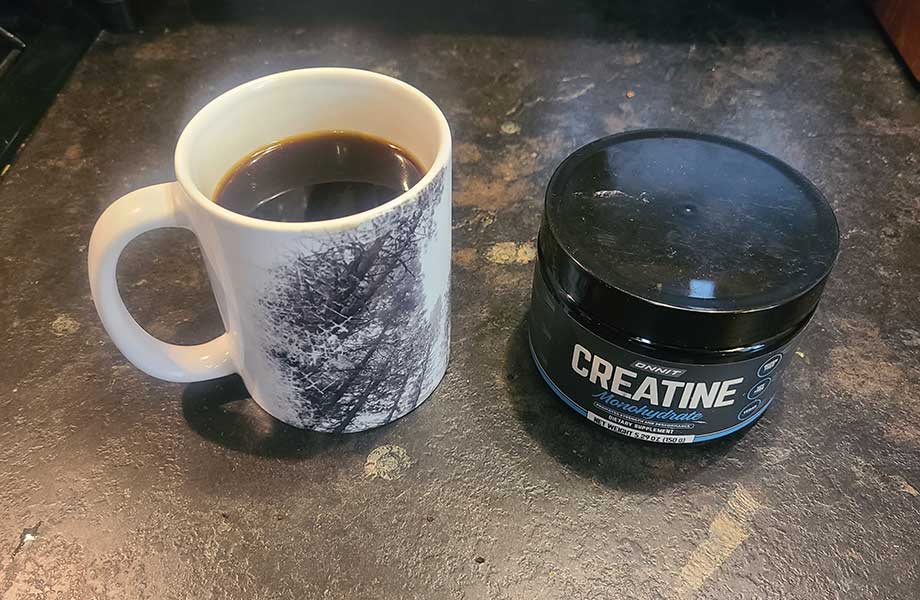
In a nutshell, coffee may be a good pre-workout for weight loss by helping you burn more fat during exercise if you use the correct dose and are new to exercising.
There’s no doubt that coffee can benefit your workout, but using the correct dosage is key to maximizing benefits and minimizing side effects.
Potential Side Effects of Coffee Pre-Workout
Coffee is generally safe for adults when consumed in moderation, but it won’t work for everyone as a pre-workout. Some people are extremely sensitive to caffeine and the effect from even a small serving of coffee can feel too intense.
Coffee increases stomach acid secretions and can trigger digestive upset4, like nausea and heartburn. Digestive issues are more common when coffee is consumed on an empty stomach. Most people can avoid digestive issues during exercise by pairing coffee with protein and carbs, like a protein shake, scrambled eggs on toast, or a handful of trail mix with nuts and dried fruit.
If you’ve ever gone for an extra cup of coffee and felt the effects of over-caffeination, you know drinking too much coffee can cause negative side effects. There’s a fine line between a good coffee buzz and a bad one. That wake-you-up, ready-to-roll feeling can quickly morph into feeling edgy, overstimulated, and even physically unwell if you drink too much coffee.
Symptoms of caffeine sensitivity and side effects5 of too much caffeine are similar and may include:
- Digestive upset
- Increased anxiousness or nervousness
- Difficulty falling asleep
- Headaches
- Increased heart rate
- Increased urination6 and/or bowel movements
- Jitters
The amount of caffeine from coffee or other caffeinated beverages you can safely consume is unique to each person. Some people process caffeine slowly, so they may experience adverse side effects from consuming a small amount of coffee, while other people may be able to consume several cups of coffee without issue.
How Much Coffee Should You Drink Before a Workout?
The International Society of Sports Nutrition recommends consuming 3 to 6 milligrams of caffeine per kilogram of body weight to boost exercise performance. The caffeine content in an 8-ounce cup of black coffee 7 is roughly 100 milligrams.
Here’s how to do the math to figure out how much coffee to drink pre-workout:
- Divide your weight in pounds by 2.2
- Example: 150 lbs ÷ 2.2 = 68 kg
- Multiply your weight in kilograms by 3 to 6 mg of caffeine
- 68 kg x 3 mg = 204 mg of caffeine
- 68 kg x 6 mg = 408 mg of caffeine
So, the ideal amount of pre-workout caffeine for a 150-pound individual would be 204 to 408 milligrams, which is roughly 2 to 4 cups, or 16 to 24 ounces, of coffee.

According to the Food and Drug Administration, healthy adults should limit caffeine consumption to 400 milligrams or less per day8, which is about four cups of coffee. The risk of side effects increases over that amount. You know your caffeine tolerance best, so stick to it.
A word of caution: Coffee acts as a diuretic and stimulates the bowels. It may get you pumped for the gym, but drinking too much coffee can send you running to the bathroom and totally disrupt your workout flow.
When Should You Drink Coffee Before a Workout?
The effects of coffee peak about 45 minutes to 1 hour after drinking it. For maximum benefit, drink your coffee pre-workout roughly 45 minutes before you plan to start working out.
The time of day you typically exercise may influence your decision to use coffee pre-workout.
The stimulating properties of caffeine can continue for hours after the initial buzz has worn off. That explains how drinking an afternoon cup of coffee can keep you wide awake well into the night.
Quality sleep is a vital component of physical and mental well-being and super important for post-workout recovery. Caffeine can keep you up, so it’s recommended to stop drinking coffee at least eight hours before bed. That means if you typically say goodnight around 10 p.m., you’ll want to stop drinking coffee by 2 p.m.
Coffee can be used as a pre-workout for morning and early afternoon workouts without impacting sleep patterns. Figuring out when to take pre-workout like coffee before late afternoon and evening workouts is trickier because it could disrupt your sleep. If you’re used to drinking coffee late in the day, it may not be a problem.
Alternatives to Coffee Pre-Workout
If you don’t like the taste of coffee, you can try caffeinated teas, energy drinks, or pre-workout supplements.
For those with a low tolerance to caffeine, look for stim-free pre-workout supplements. Stim-free simply means a pre-workout that doesn’t contain stimulant ingredients, like caffeine. Stim-free supplements may contain other energizing ingredients, like amino acids, betaine anhydrous, and creatine.
Coffee Pre-Workout: Final Thoughts
Coffee is a natural source of caffeine, which is a common ingredient found in pre-workout supplements. Coffee can be used as a pre-workout to help you feel more alert and energized. Research has found using caffeine pre-workout enhances aerobic endurance and muscle strength, increases fat burn, and delays muscle fatigue.
Coffee may be a good pre-workout for you if you enjoy drinking coffee, are on a budget, or prefer natural stimulants over pre-workout supplements.
- For pre-workout, the recommendation is 3 to 6 mg of caffeine per kg of body weight.
- An 8-ounce cup of coffee contains approximately 100 mg of caffeine.
- The FDA recommends limiting caffeine intake to 400 mg per day.
- Caffeine effects peak about 45 minutes after drinking coffee, so have coffee pre-workout 30 minutes to 1 hour before exercise.
- Too much coffee consumption can cause unpleasant side effects, like jitters, nausea, headache, and trouble sleeping.
Coffee Pre-Workout: FAQs
Is it good to have coffee before a workout?
Drinking coffee before a workout is an effective way to boost energy. There’s evidence that the caffeine in coffee also enhances exercise performance and may increase fat burn during aerobic exercise.
Should you drink coffee if you have pre-workout?
If your pre-workout supplement contains caffeine or other stimulant ingredients, you shouldn’t pair coffee with it. Pre-workouts can contain moderate to high amounts of caffeine. Drinking coffee and pre-workout too close together could increase the risk of side effects from consuming too much caffeine, such as anxiety, jitters, digestive upset, insomnia, and rapid heartbeat.
Does drinking coffee before a workout help burn fat?
There’s evidence that drinking coffee before aerobic activity, like running or swimming, can boost the amount of fat your body burns during exercise. However, this benefit appears stronger in individuals who are sedentary compared to those who train regularly.
Is coffee good for building muscle?
Coffee can indirectly help you build muscle. Coffee itself doesn’t do anything to stimulate muscle protein synthesis, but the caffeine in coffee can improve endurance and strength during exercise, which can result in more effective workouts and muscle growth. To reap the benefits, try drinking coffee pre-workout about 45 minutes before working out.
These statements have not been evaluated by the Food and Drug Administration. This product is not intended to diagnose, treat, cure, or prevent any diseases.
References
- Guest NS, VanDusseldorp TA, Nelson MT, et al. International society of sports nutrition position stand: caffeine and exercise performance. J Int Soc Sports Nutr. 2021;18(1):1. Published 2021 Jan 2. doi:10.1186/s12970-020-00383-4
- Grgic J, Grgic I, Pickering C, Schoenfeld BJ, Bishop DJ, Pedisic Z. Wake up and smell the coffee: caffeine supplementation and exercise performance-an umbrella review of 21 published meta-analyses. Br J Sports Med. 2020;54(11):681-688. doi:10.1136/bjsports-2018-100278
- Ramírez-Maldonado M, Jurado-Fasoli L, Del Coso J, R Ruiz J, Amaro-Gahete FJ. Caffeine increases maximal fat oxidation during a graded exercise test: is there a diurnal variation?. J Int Soc Sports Nutr. 2021;18(1):5. Published 2021 Jan 7. doi:10.1186/s12970-020-00400-6
- Nehlig A. Effects of Coffee on the Gastro-Intestinal Tract: A Narrative Review and Literature Update. Nutrients. 2022;14(2):399. Published 2022 Jan 17. doi:10.3390/nu14020399
- Temple JL, Bernard C, Lipshultz SE, Czachor JD, Westphal JA, Mestre MA. The Safety of Ingested Caffeine: A Comprehensive Review. Front Psychiatry. 2017;8:80. Published 2017 May 26. doi:10.3389/fpsyt.2017.00080
- Lohsiriwat S, Hirunsai M, Chaiyaprasithi B. Effect of caffeine on bladder function in patients with overactive bladder symptoms. Urol Ann. 2011;3(1):14-18. doi:10.4103/0974-7796.75862
- FoodData Central: Brewed Coffee. 2020. United States Department of Agriculture.
- Spilling the Beans: How Much Caffeine is Too Much? United States Food and Drug Administration.



